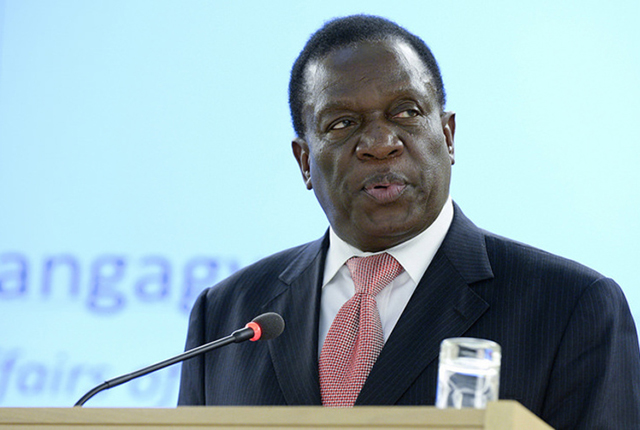Zim rights record gets UN nod


VP Mnangagwa
Takunda Maodza in GENEVA, Switzerland
Zimbabwe scored big here when the United Nations adopted its November 2016 Universal Periodic Report (UPR) highlighting the human rights situation in the country, as member-states applauded Government efforts and commitment at ensuring enjoyment of various rights by citizens.
This dealt a major blow to Western-funded non-governmental organisations that produced damning reports on alleged violations by the State.
Vice President Emmerson Mnangagwa, who is leading the Zimbabwean delegation, presented a report to the United Nations Human Rights Commission (UNHRC) on the situation in the country and strides made by Government towards the fulfilment of human rights as enshrined in the Constitution and in line with international obligations.
Sixteen out of 17 members that had raised issues on the country’s human rights situation in November last year praised Zimbabwe for making significant strides under difficult circumstances. Only Belgium raised issues with the country’s human rights situation, while Algeria, Angola, Botswana, Belarus, China, Venezuela, Cuba, Egypt, Ethiopia, Ghana, Kenya, Iraq, Ian, Burundi, DRC and the Democratic People’s Republic of Korea (North Korea) spoke glowingly about Government efforts at ensuring full enjoyment of human rights in the country.
This irritated some NGOs, the majority of whom slammed Zimbabwe’s stance on homosexuality and accused Government of being complicit in the disappearance of MDC-T activist, Itai Dzamara.
In his report to the UNHRC, VP Mnangagwa expressed Government’s total commitment to the protection and respect of human rights as enshrined in the country’s laws.
During the review, Zimbabwe received 260 recommendations, 142 of which were supported during the Working Group session, with 18 noted and 100 deferred as they required further consultation at national level.
“Zimbabwe has considered the 100 deferred recommendations and of these, I wish to inform the Human Rights Council that nine now have the support of the State, bringing the total supported to 151, while six are supported in part,” said VP Mnangagwa.
“The supported recommendations are based on Zimbabwe’s capacity to implement them within the next UPR cycle in the letter and spirit of our national development programmes.”
On recommendations pertaining to the independence of the Zimbabwe Human Rights Commission, VP Mnangagwa said it was an independent institution which enjoyed financial autonomy.
“I also wish to highlight the fact that recommendation (132.69) which urged Zimbabwe to ensure that humanitarian agencies can operate in all parts of the country without undue restrictions has been noted,” said VP Mnangagwa.
“Zimbabwe’s position is that our law guarantees the agencies the freedom to operate freely, provided that they operate within the confines of the law.”
On the recommendation (132.81) relating to provision of free quality health care services for all children, abolition of corporal punishment in all settings, and strengthening of child protection systems in full compliance with international human rights obligations, including implementation of national child protection programmes by December 2018, VP Mnangagwa said Zimbabwe was already pursuing efforts at ensuring that all children were afforded free quality health care.
“Zimbabwe is, however, unable to support the part of the recommendation concerning corporal punishment as this matter is pending before the Supreme Court,” he said.
“Recommendation 132.94 and 132.96 urged the Government of Zimbabwe to create a conducive environment for civil society organisations and also proposed a visit by the Special Rapporteur on the situation of human rights defenders in Zimbabwe.
“These recommendations are supported except for the issue concerning the extension of an invitation to the Special Rapporteur on the situation on Human Rights Defenders where Government will consider each application on its own merits.”
VP Mnangagwa also briefed the council that Zimbabwe’s legal framework prohibited torture and the infliction of cruel, inhuman or degrading punishment and such recommendation had been noted by Government.
He said Cyclone Dineo, which claimed lives and destroyed crops and infrastructure, could strain Government efforts at ensuring access to some rights by citizens, but was positive that adequate rains Zimbabwe received this farming season would ensure food security.
VP Mnangagwa noted that illegal Western sanctions imposed on Zimbabwe handicapped Government efforts at ensuring provision of some rights.
Earlier in the day, VP Mnangagwa paid a courtesy call on the UNHRC’s Zeid bin Ra’ad Zeid al-Hussein.









Comments